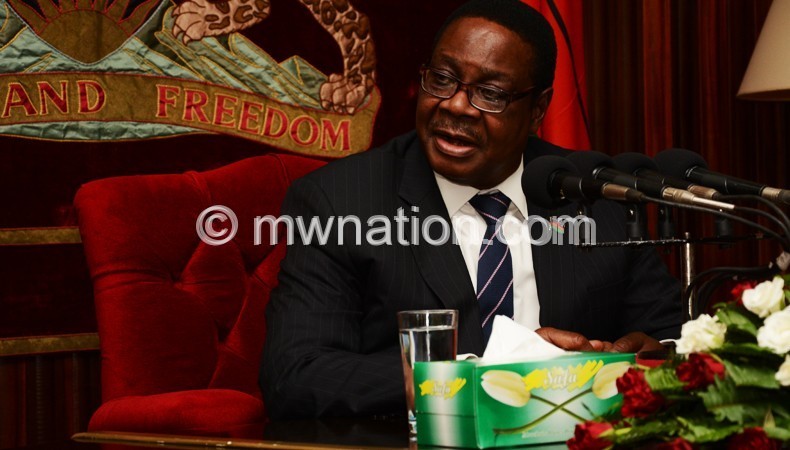‘Appointments should be independent’
On June 6 2016, President Peter Mutharika appointed new commissioners of the Malawi Electoral Commission (MEC). Nation Publications Limited (NPL) Senior News Analyst EPHRAIM NYONDO sought the reaction to the appointment from socio-political commentator Makhumbo Munthali

What is your general reaction to the appointment?
Let me first commend the President for finally appointing the new commissioners. It was really important that such a decision be made as soon as possible to facilitate the full functioning of the electoral body. Certainly, there are a lot of issues that require the commission’s action as a fully-fledged force.
Some quarters have faulted the President on the appointments, saying they do not reflect political and ethnic diversity. They link the majority of the appointees to the governing Democratic Progressive Party (DPP). What is your take?
From the very onset, it is important to note that it is not strange to have such reactions, especially when you conduct an honest and sober political analysis of the May 20 2014 Tripartite Elections and the other elections before it. It is a fact that the 2014 Tripartite Elections and of course the previous elections have been problematic as clearly evidenced by the biased State-funded media coverage, abuse of public resources during the election process by the incumbent, claims of rigging and cheating, concerns about the independence of the Malawi Electoral Commission [MEC], inadequacies of laws, failure to implement the electoral reforms and problematic voters roll.
Our perennial failure to resolve these electoral problems, as once argued by one of our respected constitutional law experts Edge Kanyongolo prior to 2014 elections, has led us to experiencing successive problematic elections, including the 2014 Tripartite elections. Unless we address these electoral problems once and for all, I can assure you that in 2019 we will witness another problematic election, and the issues of suspicion of the electoral process as partly evident in the “fabrication” of rigging conspiracy theories will continue to haunt us.
However, without necessarily taking a position on this matter, I think these reservations over the appointments should, on one hand, be viewed positively as providing a policy window or a critical juncture on which—as a country—we can urgently begin to address these electoral flaws. Political leadership is critical in driving the process forward. Regrettably, I cannot see any political will so far to drive the process forward in the best interest of the nation.
What have these previous “electoral problems” to do with the recently appointed commissioners?
As earlier hinted, one of the electoral problems that has emerged from the previous elections relates to the independence of the Malawi Electoral Commission and, particularly, the appointment criteria of the commissioners. As you may be aware, the law empowers the President to appoint commissioners after consulting political parties [represented] in Parliament and to remove from office any member of the commission on the recommendation of the Public Appointments Committee [PAC] if the member is incapacitated or incompetent in performing the duties of his or her office.
However, there have been concerns that such powers may be abused by the incumbents through appointment of people who may be sympathetic to the ruling party. As such there have been recommendations from various legal experts, civil society and other actors—a large chunk of whom has formed the much-touted electoral reforms—calling on the amendment of the law to make the appointment process more independent of the Executive. And one of the two options suggested so far, as clearly presented in Edge Kanyongolo’s recent article on Malawi Tripartite Elections, is another authority such as PAC.
The other suggested option is to maintain the President as the appointing authority, but to amend Section 4 of the Electoral Commission Act so that it requires that his or her appointment of commissioners be subjected to confirmation by Parliament or its PAC and not merely consultation with parties represented in the National Assembly. It has been suggested that the phrase “in consultation with” should also be clearly defined. These are the options we should be seriously considering. However, we have repeatedly failed to address these problems despite the unveiling of past policy windows to prompt us to act.
Any last word?
Let me commend the President for adhering to the various international instruments and also the Gender Equality Act by ensuring a 50-50 representation of women and men in these recent appointments. I think this sets a good tone in as far as Malawi’s commitment towards championing gender equality and women empowerment is concerned. However, it is important to note that at the centre of such gender equality representation, credibility and competence should reign supreme considering the sensitive nature of the elections. If the President really adhered to these factors beyond gender, I do not think it would be difficult for him to justify his decision.
Otherwise, every Malawian has the right to demand accountability of every decision made by the President. As such, these recent reservations should not be viewed negatively by the incumbent, but rather as an opportunity to justify the criteria and also spearhead the current electoral reforms which partly address some of the electoral problems facing the country.






This guy is just beating about the bush. Speaking a lot without really saying anything.
APM played a cruel joke on us. Just imagine: one of the commissioners, a Mgawi, will be almost 90 years old by the time we hold our next elections. He’s even older than the graffiti artist for Christ’s sake! Mgawi and APM will be spending quality snoozing time together – one dreaming of kang’wing’wi and the other gondolosi – while the rest of us are casting our votes.